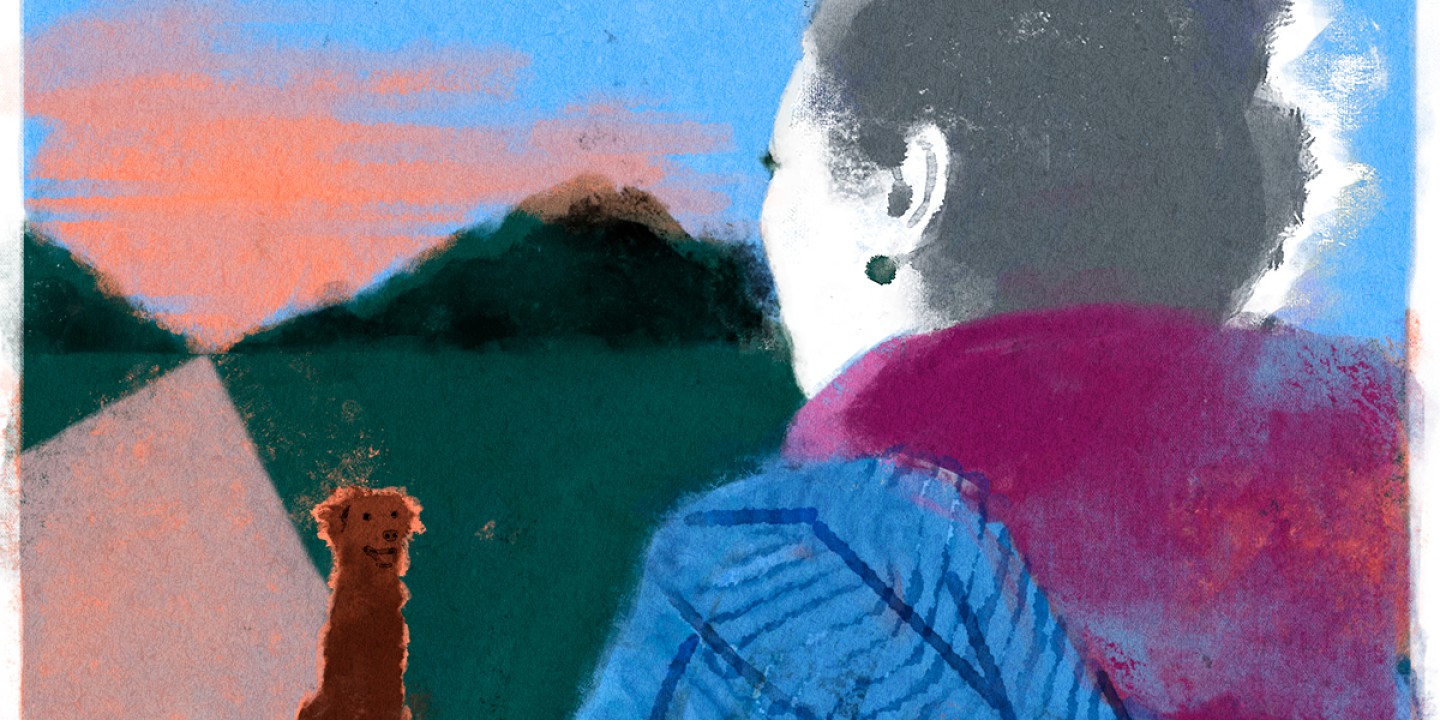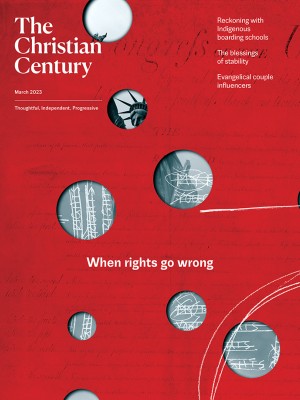Stronger than all evil things
She fled her homeland as a child. Years later, she forgave God.

Two of her uncles went missing, she told us when we asked why she’d left her homeland as a child.
After the uncles, her favorite cousin.
She and her brother kissed their parents.
Mother said stay away from the roads and take the forest and walk against the river until there are mountains—the mountains are the border. She said your food will last five days, and when you eat imagine you are tasting your most favorite things and guess for each other what these are. She said you will meet others on the way, and help them if you can but be careful. She said father and she would follow as soon as grandmother was strong enough.
Father said everything mother has said you must do. He said the address over the border you have memorized—tell each other again and again, and promise if ever separated there you must meet. He said you must not turn back for any reason. Then there was nothing in his face.
Read our latest issue or browse back issues.
The first two nights she did not sleep.
The third night she gave raisins and bread to a woman and a man who looked hungry and said they were. She told them to imagine they were tasting their most favorite things, and they did and she guessed right, and the woman said surely this is a sign. The man agreed.
The man said they had a friend who had a car and gasoline and the right papers and they should all ride together across the border the next day. The woman said at the border there are green mountains. The man said they are so tall they disappear into the clouds. The woman said her brother must be only four, or five at most, and was fortunate she was such a good and brave older sister. The man said riding the rest of the way would be much better than walking for her brother and for her. The woman agreed.
She thanked the woman and the man and said she would tell them her decision in the morning.
In the morning her brother and the woman and the man were gone.
Her brother’s shoes were not gone.
She searched all day and all night. She forgot to eat. No one knew anything. They thought things were not good and she should keep going. In the twilight of her second day of searching she saw an elderly man sit down and lean against a red beech and take his hat off his head and place it in his lap and fold his arms. Someone held a water bottle to his lips, and he closed his eyes and drank for a long time and none of the water spilled. She remembered her food and went to offer him something, but he unfolded his arms and put his hands on the ground by his sides and died. She hid her face and wept.
She reached the border and crossed it with others and found the address. The house was crowded. People spoke more at night than during the day.
She slept on the floor in a clean corner of a windowless room beside a woman who dreamed the same dream twice in the first week and told the dream and its meaning to her. In the woman’s dream, hands without their bodies were drawing a veil across the world and birds were flying away. You could not see or hear your loved ones from behind the veil, but they could see and hear you from their side of it. It was certain and was the whole purpose of the dream that your loved ones understood the hands must be stopped and would find the bodies of the hands and tell the bodies to make the hands stop—and the hands would stop. Knowing this was going to happen was a great comfort until it did.
She remained at the house for a long time, sleeping beside the dream woman for many nights. Finally it was said the house was no longer safe. When she asked to wait at least until the next ship she was told there is no next ship and she had an entire lifetime left so she must go and live it. When she asked about the dream woman she was told the woman had already gone to the ship but on the ship she did not find her.
She worked to live. She married for love. She never once kindled a fire on the sabbath.
At some point she forgave God. It did not occur to her to remember when. Over the years she met others who had forgiven God, and just as many who had not.
Her only child and three grandchildren immigrated. Four years later they finally persuaded her to join them.
Before she left she took one last stone to her husband’s grave. He would miss her, but he was glad she was going. And only one more thing. He had found out that her brother had survived. His life had been full. She should know this and remember it. Her brother wanted her to give his shoes to someone who needed them.
She knew her husband meant well. He had always been like this. She decided against asking him questions. She found someone who needed the shoes.
In her new city her family helped her rent a flat on the third floor of a gray building with terraced garden plots on the southeasterly slope behind it. The slope ran down to a broad, seasonal stream channel with a hedge of sumac on its far side. The sumac grew against the back walls of a row of market stalls with terra-cotta tile roofs. Every spring she tilled one of the garden plots. Her family wanted vegetables. She insisted on flowers.
Twice weekly she took the 23 bus to a residential clinic where the children did not recover. She would tell the children stories and peel oranges for them. They gave her ribbons, foil wrappers, and pictures of her drawn on lined paper. She kept them all in shoeboxes under her bed.
Waiting at the bus stop in the winters she was cold. With help the children in the clinic knitted her a tasseled shawl in their craft room and surprised her with it. It was sky blue and perfectly sized. It was warm, and she looked spectacular in it. One of the younger children from a village in the north told her it was stronger than all evil things. An older child whispered to her no, but almost.
At 73 she founded a nonprofit with her best friend.
At the end of the rains in the spring she turned 91 she moved from the third floor to the ground floor of her building. A stray dog, small with matted hair the color of sand, began to sleep nights in her garden plot in a shallow burrow he would scratch out between its stone boundary tier and a row of sage. He never barked or made any sound at all.
Every morning he would leave the garden when she approached. She would fill in his burrow. He would stand nearby and watch. When she finished she would return his gaze. He would turn and canter down the slope and across the dry streambed at its base and disappear into the sumac hedge beyond, all as silently as a shadow floating on water. Every evening he returned and dug the burrow out again.
One July morning he did not leave the garden and she did not fill in his burrow.
She named him Ishmael.
By August he was following her during chores. In October when the rains returned she made him a pallet just inside the entrance to her flat.
The following January a neighbor poisoned him. She knew which neighbor and why.
Ishmael’s hair fell out in clumps along his spine and on top of his hind legs. She gathered up much of it. Scaly patches of brown and pink and gray skin appeared where his hair had been, making him look like one dog made from the parts of many dogs.
Soon he could not walk. He was always thirsty. He would not eat.
She held him. She gave him water day and night. She sang to him in three languages.
He stared at her and lived.
When he was well she took a portion of his lost hair in her right hand and stood before the gate of her neighbor.
On the second day her neighbor admitted to the poisoning and repented forever.
Early one morning late that May she and Ishmael were standing completely still in silver light on the center path of her garden plot. They were not working. They were not doing anything more important than standing there.
We offered her an apricot viennoiserie from her favorite bakery a block away. “It is too beautiful,” she said. By “too beautiful” she meant more beautiful than is possible. By “it” she meant the warm pastry, the first hours after dawn, Ishmael with his brown and pink and gray skin, her family, her flowers, the ribbons and foil wrappers and pictures of her on lined paper in shoeboxes under her bed, her sky-blue perfectly sized tasseled shawl, the work of her nonprofit, many of her decisions, forgiving God, most of her memories, and life.
Three weeks later she died peacefully in her sleep. She had not been ill.
The family of her oldest grandchild took Ishmael in. He would drink, but for days he would not eat. Then they made a discovery. He would eat if someone sang.





